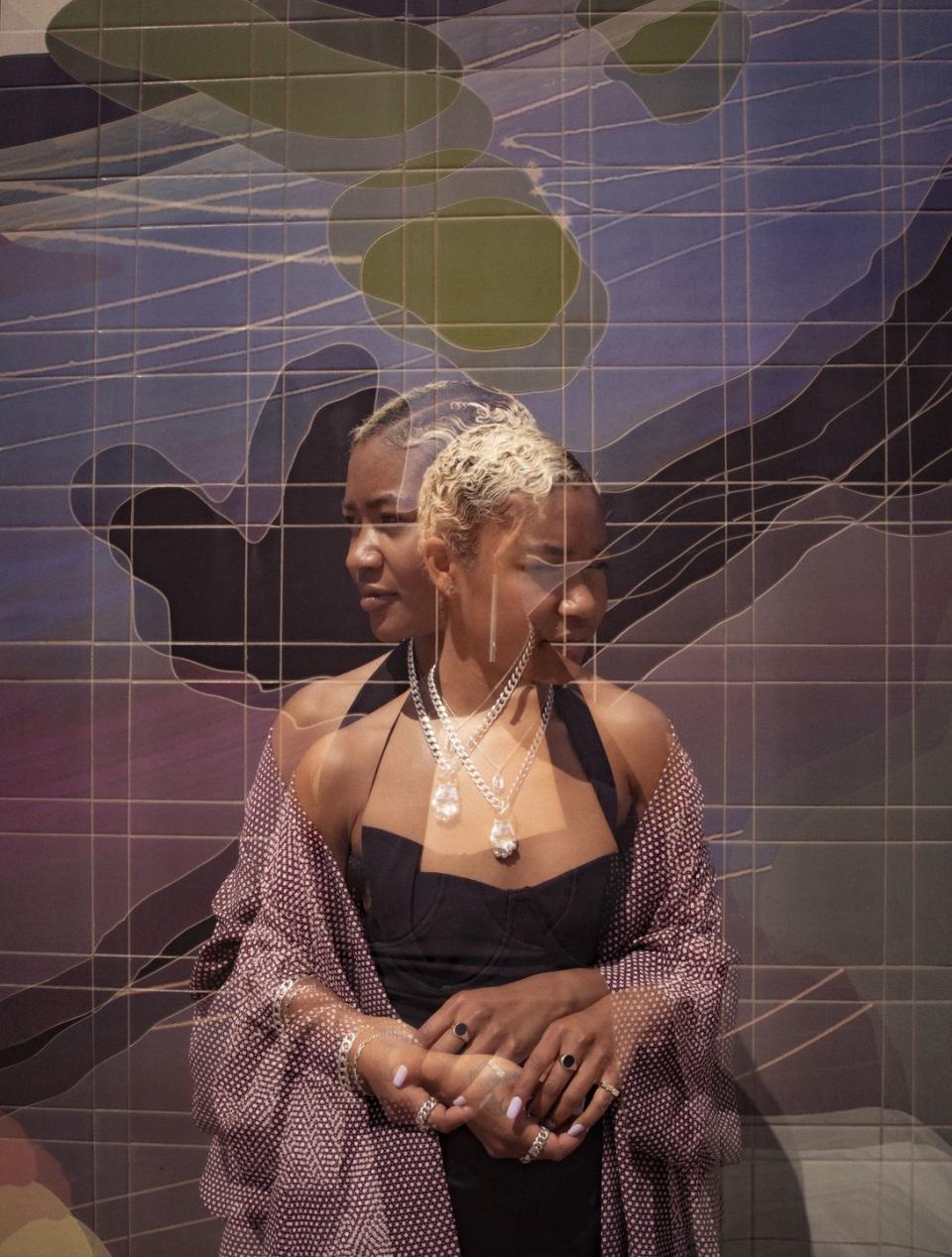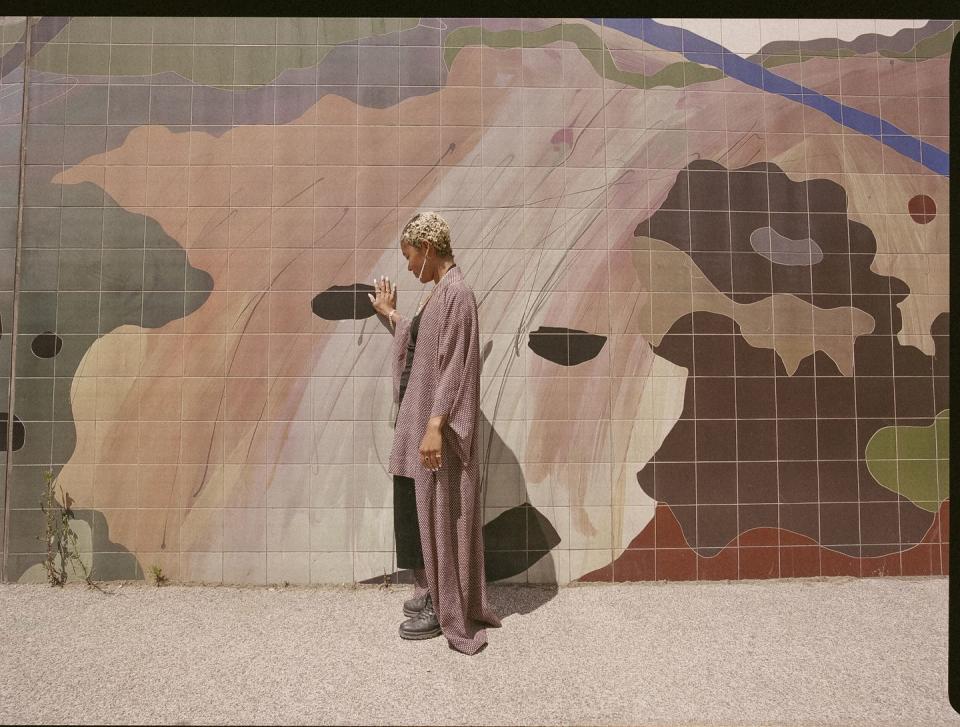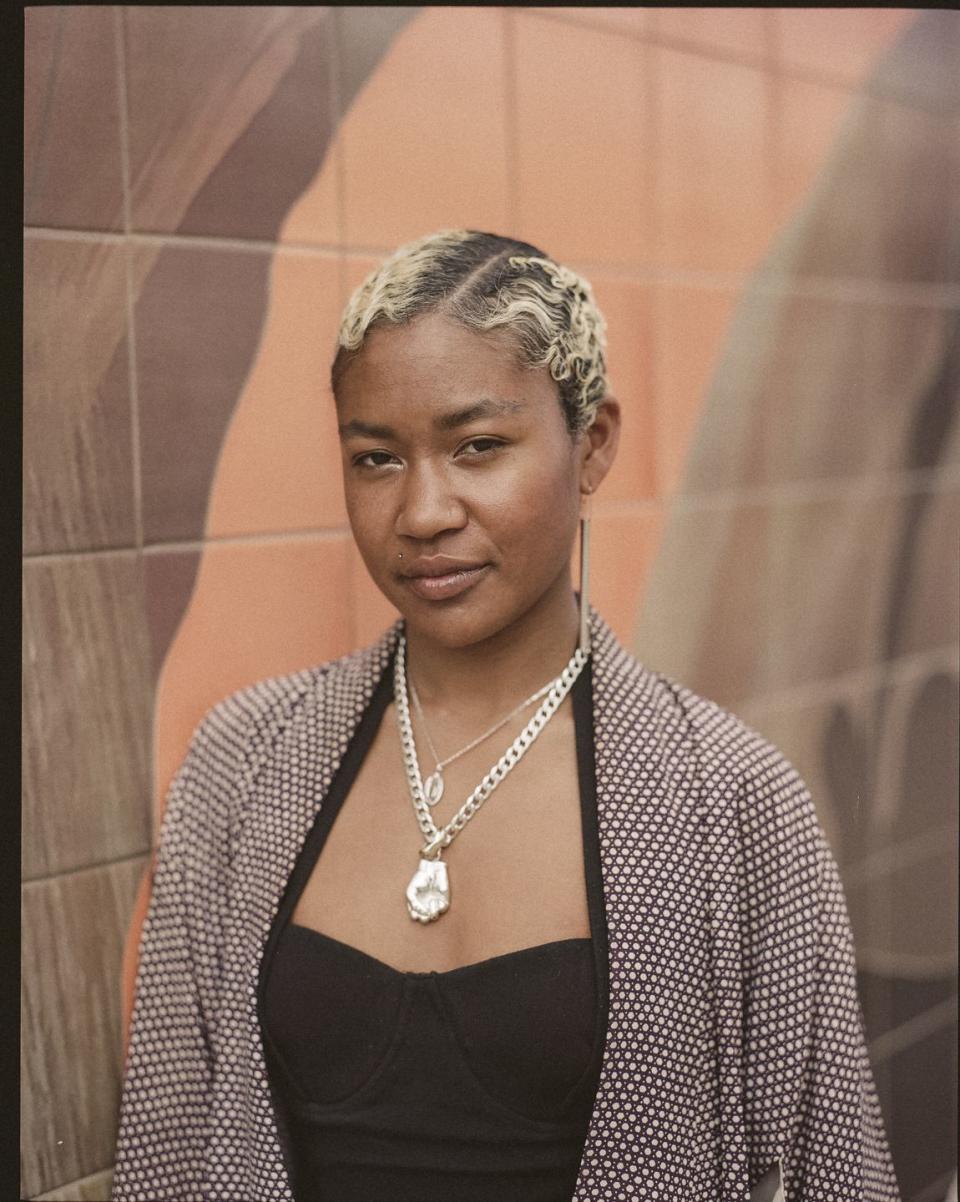Designer Claire Yurika Davis on breaking into fashion, overcoming obstacles and tackling grief head on

If you haven't heard of Claire Yurika Davis, then it's time to put her on your radar. The London-based designer, who specialises in working with latex, is not only doing exciting things in fashion design, she’s also using her platform to talk about relatable issues close to her heart - from sustainability and the problem with unpaid internships, to her experience with grief and why we need to openly talk about loss.
Shortly after graduating in 2012, Davis founded her own label, Hanger, in 2013, with the simple aim of creating "good clothes for good people”. While its bold, innovative and statement-making aesthetic is the defining feature, the brand also quietly focuses on sustainability and zero waste. Her talent attracted recognition from producers at Netflix series Next In Fashion, hosted by Alexa Chung and Queer Eye’s Tan France, and she was chosen as a contestant.
“The show was a rollercoaster of insane highs and extreme lows," she tells me. "After the editing process, you obviously don’t see everything...” Davis starred alongside 18 other talented designers, who all faced challenges each week themed around specific trends or influential styles, all to impress the line-up of guest judges, including Christopher Kane, Tommy Hilfiger and Instagram’s Eva Chen.

“It was an intense situation, but I met so many people that I really love," she says of the experience. "We all hung out together a lot, so it’s a great opportunity to make new friends that you connect to on a deeper level. With an experience like that, you really do need support, so you come together to do so.”
Davis stood out on the show for her warm and positive energy, as well as her fearless approach to design. Fashion, she says, has always been a goal for her - ever since she was a child.
“I was always customising and creating while growing up, so I knew that’s what I wanted to do and that’s what I was good at,” she says.

Like many with dreams of working in the fashion industry, Davis began her career by interning - but encountered countless obstacles in the form of funding, sexism and racism.
“A lot of places expect their interns to work every single day without paying them. How are they meant to earn any money to live at all?” she points out. “I tried to find a job but there wasn't anything out there. I had always wanted to launch my own brand, so it felt as though there couldn’t be a better time to go it alone.”
She continued: “I balanced the freelance work I was doing and put what I earned back into my business. I have a bunch of really talented friends who were able to help me. They called in favours for me and that’s how I started. Once you begin, it just keeps on going really.
"It was hard at the beginning, I had a tough experience with factory managers. They were normally older men who didn't want to take any instructions from a small Brown female such as I. I was literally just trying to make clothes and there was just so much aggression.
"It was taking a toll on my mental and physical health. At some point I started sending a friend, who was a white guy, to talk to them and then obviously everything was fine and sorted straight away. It's unsurprising and depressing at the same time that that was the reality."
Davis describes how she felt overwhelmed by the structure of the industry. As an advocate for sustainability, she felt it was hypocritical to continue working season by season, so she changed her business model and now creates one collection a year with smaller drops in-between. Her new way of working rejects fashion's typically relentless pace, which dictates that designers churn out collections up to eight times a year, often creating a vast amount of waste in the proceeds.
For Davis, it was more important to remain true to her values rather than adhering to arguably outdated industry traditions.
“I went season-less as I just didn’t understand how people were making multiple collections per year, especially as a smaller brand with just one designer. It’s so archaic," she says. "I found that, when I finally would release my stuff, it'd be new or relevant for about a month and then it was already old and then I was expected to send across the next thing."
“I got to a point where I needed to make the structure about what makes me happy. It’s my business and no one else’s. I don’t want to place pressure on myself to constantly create. There are a lot of ways I can still do business and influence attitudes to fashion and clothing without having to drop something new all the time.”
While on Next In Fashion, Davis opened up about the death of her father a few years ago. Speaking about something so personal in such a public way could feel overwhelming to some - and, rightfully so - but Davis felt strongly that it was an important topic to talk about. The designer wanted to dismantle some of the taboo that still exists around talking about grief and loss.

“My dad’s death and all my grief didn’t need to be private,” she reflects. “For me, my main issue when he died was how taboo and secretive it seemed to be and how many people were awkward about it.
“That kind of attitude upset me, it was like I was being made to feel this shame over having a dead dad. There’s nothing shameful about losing a loved one and I shouldn’t have been made to feel awkward talking about it. You need to talk about your feelings to work through them - to not do that isn't healthy.”
As we talk, I reflect on what we both have in common, losing a parent at a young age. My dad died in 2014, when I was 18, and hearing her honest, straight-talking approach to death was refreshing after so many years of feeling so misunderstood. As an openly spiritual person and tarot card reader, Davis accepted her grief as part of her.
“It’s important to have conversations with people about grief and death as much as possible," she says. "It’s as if it exists in people’s minds as this untouchable conversation and as something that you only talk about when it happens to you.”
Davis points out that there are support groups available such as The Grief Network, which talks openly about death and supports those grieving in the same candid, straightforward way. In a recent collaboration, The Grief Network teamed up with Sister magazine during lockdown to create an issue that aimed to help those grieving in isolation to feel less alone, in which Davis opened up about her father and how society deals with death.
Not only do groups like this support those that need it and make them feel understood, but they also work to improve the general conversation around grief and bridge those going through it with those who aren’t or haven't.
“It’s a worldwide, but also very Western issue, particularly in the UK, where we are inherently stiff with subjects like that," she says, adding that many Brits employ the same repressed attitudes towards sex: we just don't talk about it.

Davis raises an interesting point; how is it possible to grieve in a healthy way, when society is so scared to talk about death? Is the answer in education, in the same way we teach children about sex in schools? Or is the responsibility on ourselves to change the way we approach it?
“It’s difficult but also simple,” she says. “The main starting point is talking about it and opening up the conversations.” Start by joining various support groups, reading, listening to grief-focused podcasts, she suggests, or simply by sharing your feelings with your friends and family.
Davis' father was Jamaican, so the funeral itself was very different to those we might be familiar with in the UK. “A funeral is meant to be a celebration," she says. "In Jamaica, you party for a week straight. You have a grave-digging party and every process of the funeral is a celebration where everyone is cooking food and coming together.”
She pauses, thoughtfully. “Grief will always come at you in waves. There are times when you’re drowning and times when you’re okay."
As our collective understanding of mental health has improved, the narrative surrounding grief and death has changed. The outpouring of public sadness over recent high-profile celebrity deaths, plus shows like Dead to Me and Grayson Perry: Rites of Passage have been praised for their depictions of grief and the different way that it can manifest itself.

“Shows about death should be in the public sphere," says Davis. "It allows people to see that death doesn’t have to be only about sadness. It’s good to see the difference in approaches between different people and cultures.”
“Taking the time to do a lot of internal work is invaluable and that needs to be done," she concludes. "People are detached from the concept that life will end. It’s about being at peace with something that happens all around us, to everyone. It’s part of life.”
For more on Davis' brand visit Hanger Inc or to book a tarot reading visit Yuri Tarot.
Photography by Stephanie Sian Smith.
In need of some at-home inspiration? Sign up to our free weekly newsletter for skincare and self-care, the latest cultural hits to read and download, and the little luxuries that make staying in so much more satisfying.
Plus, sign up here to get Harper’s Bazaar magazine delivered straight to your door.
You Might Also Like


